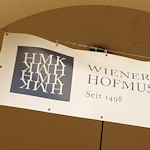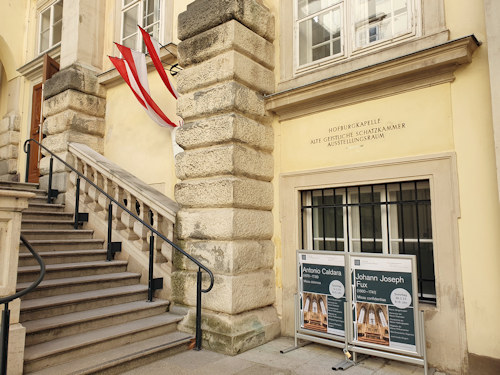
July 7th, 1498 was a Thursday, apparently. This was also the day that Emperor Maximilian I decided his chapel choir needed an upgrade, thus bringing to life an institution that is still going strong over 500 years later: the Wiener Hofmusikkapelle.
- Now a prestigious state music ensemble
- An orchestra and choir drawn from Vienna’s best
- Regularly performs in the Hofburgkapelle chapel
- Tickets available for visitors too
- See also:
Tradition and class

(The Wiener Hofmusikkapelle, conductor Johannes Ebenbauer; press photo by Lukas Beck)
Wiener Hofmusikkapelle translates as Vienna Court Music Ensemble, which hints at its history and reputation.
Starting in 1498 with a handful of singers and a conductor, the Hofmusikkapelle became a permanent court institution in Vienna, fulfilling both a musical and representational function for the Habsburg monarchs.
The ensemble grew in scope, size, and prestige through the centuries, attracting talented singers and musicians from around Europe.
The scope and repertoire depended on the musical proclivities, policies, and budget of the particular ruler of the time. As a result, the ensemble often took excursions into wider classical music. Though the associated with church music remained a constant.
To give you an idea of the quality and reputation of the ensemble, consider that Antonio Salieri, teacher of Beethoven and Liszt, was once master of the Hofmusikkapelle.
At various times, you might have heard Franz Schubert sing or Johannes Brahms play the organ. Riccardo Muti is an honorary member today.

(Antonio Salieri once led the ensemble. Portrayed here in a print by Heinrich Eduard von Wintter from 1815; Wien Museum Inv.-Nr. W 5671; excerpt reproduced with permission under the terms of the CC0 licence)
After the demise of the Habsburg monarchy following WWI, performances paused for just a couple of months before the Hofmusikkapelle continued under the auspices of the state. Today, it forms a standalone cultural unit within the Austrian Federal Ministry for Arts, Culture, the Civil Service and Sport.
Who’s in the ensemble?
Current ensemble singers come from the Vienna Boys’ Choir (or are former members) and the mens choir of the Vienna State Opera.
The ensemble’s orchestral musicians mostly play for the Vienna State Opera Orchestra and, with very few exceptions, are also members of the world-famous Vienna Philharmonic Orchestra.
Hard to get more prestigious than that.
Incidentally, the Vienna Boys’ Choir connection is no coincidence. The choir grew out of the original Hofmusikkapelle in that chaotic aftermath of WWI.
Where can you hear a performance?
Continuing its traditions, the Wiener Hofmusikkapelle accompanies Holy Mass services on Sundays from mid-September to June at the Hofburgkapelle (Imperial Court Chapel) in the Hofburg palace complex.

(The entrance steps to the Hofburgkapelle)
As such, these services offer an unusual and rare opportunity to experience some of Vienna’s best singers and musicians relatively easily. (In fact, I’d go so far as to say some of the world’s best.) And all in the kind of historical setting few cities can offer.
You will need a ticket, though (details at the official website).
This is not a concert in the conventional sense: the ensemble provides the liturgical music from an upper balcony, though the Vienna Boys’ Choir typically performs motets in front of the altar at the end of proceedings.
A brief look at the programme revealed such Mass compositions as Mozart’s Coronation Mass, Monteverdi’s Messa a quattro voci da capella, Bruckner’s Mass No. 1 in D minor, Haydn’s Mass in Time of War (which premiered at Vienna’s Piaristenkirche church), and Johann Joseph Fux’s Missa confidentiae.
Fux actually served as master of the ensemble back in the early 1700s. History is well and truly alive in Vienna.
Address: Hofburg-Schweizerhof, 1010 Vienna | Website